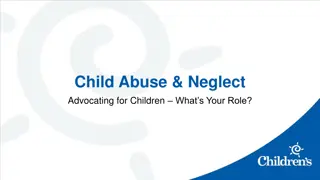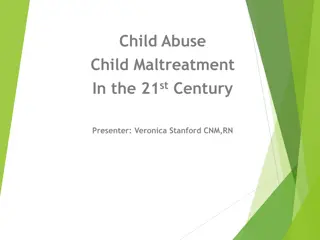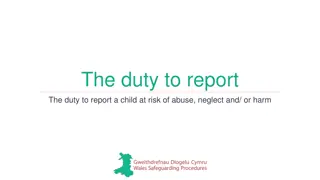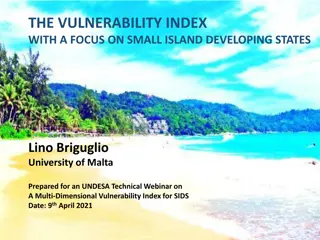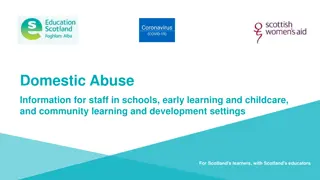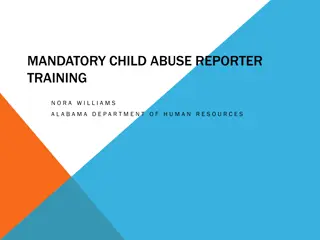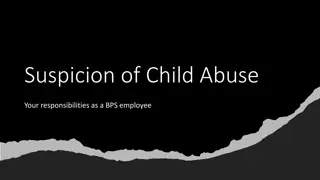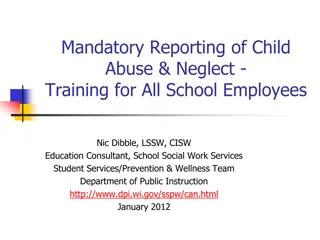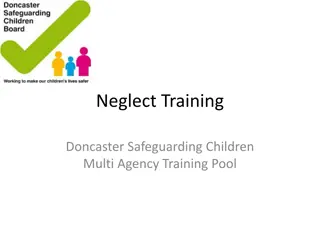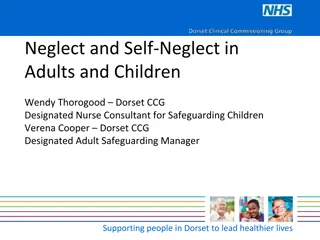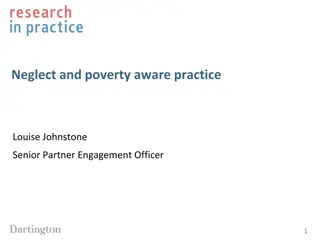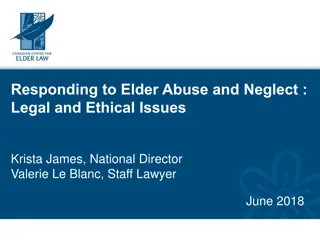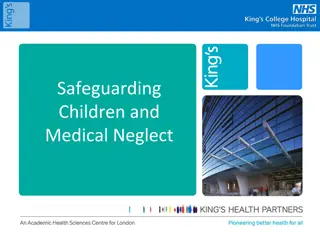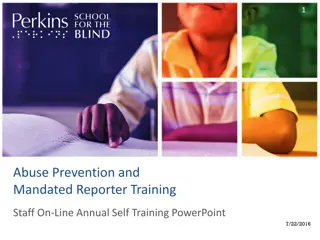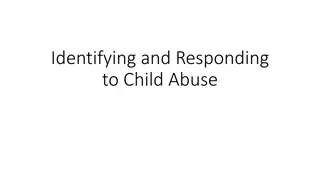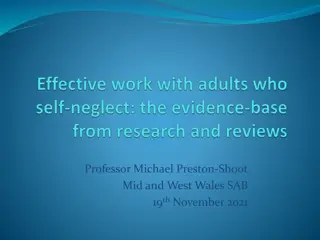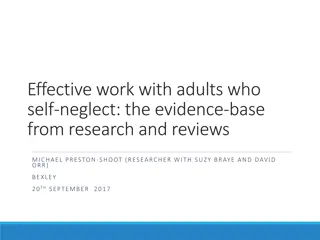Children with Disabilities: Vulnerability to Abuse and Neglect
Children with disabilities are at a significantly higher risk of experiencing abuse and neglect compared to their non-disabled peers. Incidents such as criminal neglect, sexual abuse, and maltreatment have been reported, highlighting the urgent need for prevention programs and tailored interventions to protect this vulnerable group. Studies indicate that children with disabilities are 2.5-4 times more likely to suffer abuse and neglect, emphasizing the critical importance of addressing this issue.
Download Presentation

Please find below an Image/Link to download the presentation.
The content on the website is provided AS IS for your information and personal use only. It may not be sold, licensed, or shared on other websites without obtaining consent from the author. Download presentation by click this link. If you encounter any issues during the download, it is possible that the publisher has removed the file from their server.
E N D
Presentation Transcript
Are Children with Disabilities More Likely to Experience Abuse and Neglect? If So, Why? Findings from Israel Dori Rivkin HARUV VIRTUAL SUMMER SERIES June 24, 2020
A Few Incidents A 14-year-old boy, apparently disabled, who has not left his home since the age of two, was found today by police officers inside a shed sealed with iron and rubbish heaps, suffering from criminal neglect by his parents. The boy was evacuated by emergency services to the hospital while his parents were detained for questioning. When Hanna, a 13-year-old girl with intellectual disability started showing behaviour problems such as negativity and temper outbursts, the school assigned a volunteer to try to help. Once she won Hanna s trust, Hanna told her that she got special attention from her father, that they slept together in the same bed and that he touched her at night. "It doesn t always feel good, but this is how good girls behave . The volunteer was shocked and told the school counsellor. The father was taken for questioning and eventually confessed having intercourse with his daughter. A 13-year-old boy with intellectual disability was sexually abused in a synagogue near his home. One Friday evening, one of the worshipers invited him to enter the synagogue with him and sexually assaulted him there. A few weeks later, the offender passed him and his mother on the street. He began to tremble and behave, according to his mother, "strangely." His mother insisted on understanding what was happening to him - and then he told her about the abuse. 2
Inter-Agency Forum on Abuse and Neglect of CWD Mission: to advise the government on policy and services needed. Some of the issues addressed: Prevention programs Intervention with victims and offenders Adapting universal services vs specific services for CWD But, without data and an evidence base, none of this could be implemented
MJBs Project Review international literature Estimate the number of CWD exposed to abuse and neglect in Israel based on existing data 4
Children With Disabilities are Far More Likely to Suffer Abuse or Neglect In Nebraska CWD are 3.4 times more likely to suffer maltreatment than other children (31% vs 9%) (Sullivan and Knutson, 2000): U.S.A. CWD 2.75 times more (11% vs 4%) - estimate based on US Dept of Health and Human Services and Child Welfare Information Gateway )2012) Different studies use different definitions of CWD and of child abuse and neglect Overall, CWD are 2.5-4 times more likely to suffer abuse and neglect than other children 6
Jones et al: Meta-analysis of 17 studies Among 18,000 subjects with with disability 20% physical abuse in childhood 20% emotional abuse 14% sexual abuse 27% more than one type of abuse Jones, L.; Bellis, M. A.; Wood, S.; Hughes, K.; McCoy, E.; Eckley, L.; Officer, A. 2012. "Prevalence and risk of violence against children with disabilities: a systematic review and meta-analysis of observational studies". The Lancet 380(9845), 899-907. 7
Children with Certain Types of Disabilities are at Higher Risk for Abuse and Neglect Children with impairments in communication, learning disabilities, behavioral disabilities and sensory disabilities (Stalker & McArthur, 2010) Children with mental health disabilities (Heinonen & Ellonen 2013) Children with multiple disabilities (Heinonen & Ellonen 2013) Children with non-severe vs children with severe disabilities (Fisher et al., 2008; Helton & Cross, 2011 8
Children with Disabilities often Suffer More Severe Maltreatment Study in Turkey found more severe sexual abuse (Akbas et al. 2009) Abuse starts at a younger age before starting school (Sullivan & Knutson, 2000) 9
Why do Children with Disability Suffer more Abuse and Neglect? CWD are seen as less likely to understand, resist or report abuse Greater dependence of CWD on parents and other caregivers Parents experience higher levels of stress and ambivalence in raising child with disability Sometimes, the disability is exacerbated or even caused by abuse Schools and other services not aware of higher risk for abuse and how to recognize it in CWD CWD less likely to report or communicate about abuse 10
Children with Disabilities are less Likely to Report the Abuse % of Children who Disclosed Abuse during Interview with Child Investigator (Hershkovitz et al, 2007) Non-severe disability No disability Severe disability Suspected sexual abuse 72 61 54 Suspected physical abuse 61 56 46 11
Are CWD in Israel also more at risk for Abuse and Neglect? 12
Method 1. Locate data bases which have information relating to Child abuse or neglect Disability Calculate percent of children with disability in each data base Compare to estimated prevalence of children with same definition of disability in general population Calculate relative prevalence 2. 3. 13
Ok, Lets look at the Data Bases Ministry of Welfare (7) i.e. CWD, CPO, Sexual Abuse services Ministry of Health (1) Hospital reports on family violence Police victim data Ministry of Internal security (3) national surveys on violence etc. Ministry of Education (1) reports on abuse We found only 3 data bases with individual information on disability and abuse 14
Findings Child Investigator Reports Children with Intellectual Developmental Disability 3.5 times more prevalent than in general population Children with Autistic Spectrum Disability 4.8 times more prevalent than in general population Child Protection Officer Reports Children with disabilities 2.1 times more prevalent than in general population But, could this stem from children with disabilities being under the spotlight ? 15
3600 - National Program for Children and Youth at Risk The data 3600 provides funding for services for children and youth at risk at the local level for most of Israel Screening all children in the program for abuse and neglect by staff of universal services well-baby clinic nurses, nursery school and K-12 teachers The program created a large data base of children in Israel based on this screening The findings 25% of the children screened for abuse or neglect were children with disability 9% of the children in Israel are CWD Children with all disabilities were indicated 2.8 times more (25% vs 9%) Children with severe disabilities indicated 3.1 times more (13% vs 4.2%) National estimate 90,000 children with disabilities subject to abuse and/or neglect 16
Summary Children with disability are more likely to suffer abuse and neglect Effects of type of disability, severity and multiple disability International findings indicate 2.5-4 times higher prevalence than other children Data from Israel shows similar trend Abuse and neglect of CWD 2.1 4.8 times higher than other children Best Israeli estimate 2.8-3.1 times higher Policy and services need to consider higher prevalence Awareness in screening Making services accessible for CWD and their parents Considering effect of different disabilities on vulnerability and abuse 17
Thank you for listening You re welcome to stay in touch dorir@jdc.org www.facebook.com/MJBInstitute brookdale.jdc.org.il/en/ 18



